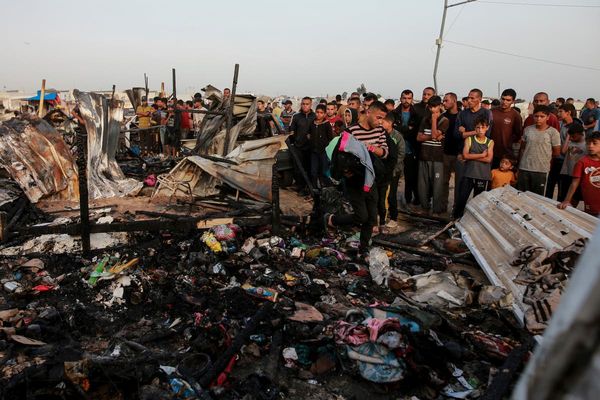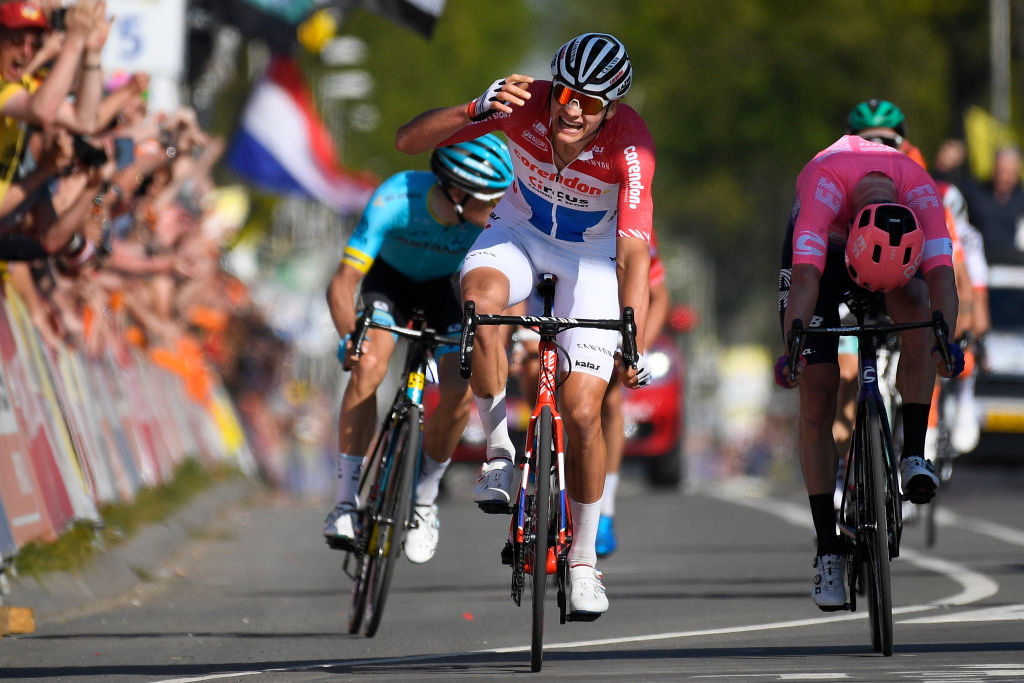
When Mathieu van der Poel announced his spring race program earlier this year, the fact that Amstel Gold Race was definitely on his schedule, that Flèche Wallonne was definitely off it and that Liège-Bastogne-Liège was ‘definitely maybe’ didn’t feel irrelevant. But almost.
Truth be told, it was hard to look beyond the Alpecin-Deceuninck leader’s 2023 defence of two Monument titles at Milan-Sanremo and Paris-Roubaix, as well as his new opportunity to join the record holders in Flanders with a third win in five years. And there’s no doubt that even if Paris-Roubaix, rather than Liège, concluded the 2024 Classics season, memories of what Van der Poel has now managed to achieve in the last 10 days will endure long in cycling’s collective memory.
Quite apart from Van der Poel’s moving into the upper echelons of the very best all-time Classics riders thanks to his Flanders-Roubaix double, Alpecin-Deceuninck’s newly established record as the first team ever to take all three of these Monuments in the same spring make them the squad to beat for next Spring's Classics as well.
But such astounding success also leaves us with an equally interesting question - short-term, where does Van der Poel go from here?
At this point in time, Van der Poel’s presence (or not) in the three Ardennes Classics, starting Sunday at the Amstel Gold Race, has something of the feel of encores at a very good rock concert. The main tracklist of Van der Poel's one-day racing has been performed by now, yet even as the applause dies down, expectations and hopes of something special still to come in the following few minutes remain extraordinarily high. Essentially, nobody in the audience wants to get up and leave just yet.
Cancellara's Classics column: After Flanders-Roubaix double, Mathieu van der Poel should ride Liège-Bastogne-Liège
Amstel Gold Race 2024 - the complete guide
Liège-Bastogne-Liège - the complete guide
'I didn't expect to be alone' – Mathieu van der Poel just too strong in 'unplanned' Paris-Roubaix attack
The good news is that whatever happens after Van der Poel pedals back on stage on Sunday in Maastricht's Grote Markt, he's heading into far less familiar ground than when we saw him confidently bound away 60 kilometres from the finish in Paris-Roubaix. (The predictability of the outcome after he did so last Sunday, let it be said, was all to Van der Poel’s credit, given how notoriously treacherous the pathway to victory in the Queen of the Classics can be.)
This is true even if the Amstel Gold Race has featured in Van der Poel's previous race repertoire. After all, his victory in 2019 was where he made his breakthrough major Classics triumph, courtesy of a blistering last-minute dash past a late breakaway and he got fourth, too, in 2022.
But compared to Roubaix or the Flemish Classics, his total of just two participations to date in Amstel means it remains something of an outlier. And should Van der Poel venture any further south than the hills of Limberg on Sunday evening, towards Liège and a race where he's only participated once, in 2020, he'll be heading into more unchartered waters.
Nor can what he’s facing be underestimated. It’s not just that his one performance in Liège garnered a sixth-place finish, the kind of result that's good enough to ensure he can’t be ruled out, but by no means good or recent enough to be a guarantee he can repeat it. That argument carries even more weight given that 2020 was the pandemic year when almost all the results of that haphazard season had a slightly weird tinge to them.
But quite apart from the much hillier terrain he'll face in comparison to his usual stomping grounds in the Ardennes, the presence of another giant of one-day racing, Tadej Pogačar (UAE Team Emirates), in Liège’s 2024 start list, instantly pushes the Classic onto a wholly different and much more difficult level. Certainly, assuming Van der Poel really does try to become the first rider since Sean Kelly in 1984 to take Roubaix and Liège in the same season, thanks to Pogačar's presence, a major duel between two top racers could well be on the table.
The only other rider in the current peloton to hold a candle to Van der Poel’s Monument total – five to the Dutchman’s six – Pogačar is also one of the few riders to break Van der Poel’s cobbled Classics domination last year in Flanders. Furthermore, the Slovenian’s chequered history with Liège-Bastogne-Liège following last April’s crash-out will likely only further heighten the UAE Team Emirates' motivation for a repeat of his 2021 victory on the Boulevard de Sauvenière.
There’s also the question of how Van der Poel and Pogačar's remarkably similar strategies for winning Monuments could play off against each other on Liège’s 11 classified climbs and 4,100 metres of vertical climbing, culminating in the agonisingly steep Côte de la Roche-aux-Faucons. Long-distance moves are an inhouse speciality for both riders, this year alone be it Pogačar at Strade Bianche, attacking 81 kilometres from the finish line in Siena, or Van der Poel doing his double at Flanders and Roubaix a few weeks later.
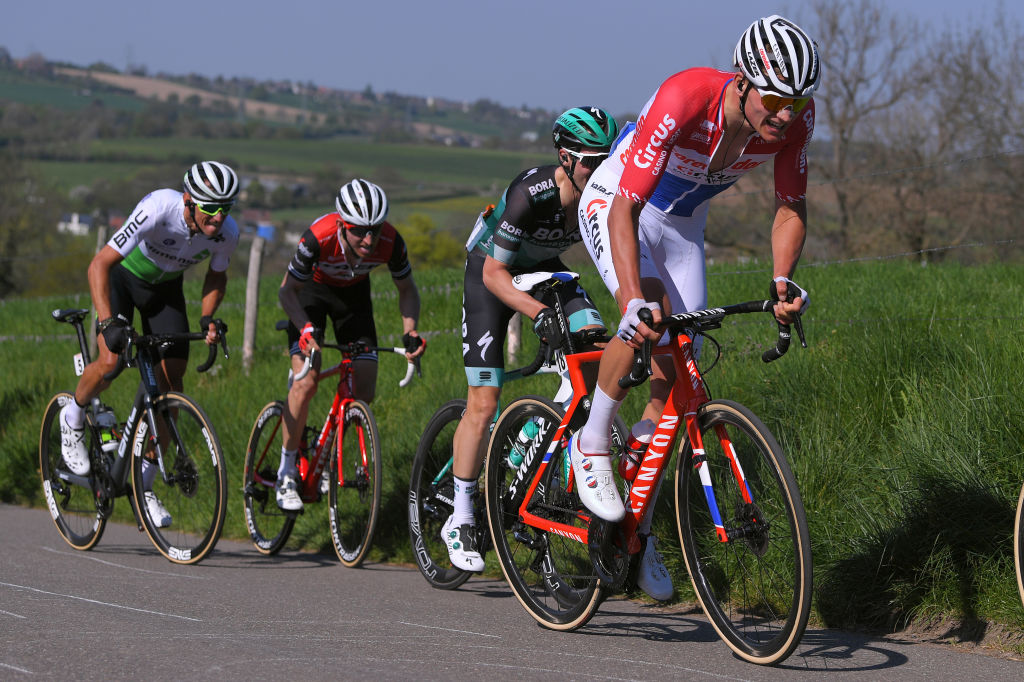
The best of the three?
In some senses, it’s regrettable that Pogačar will be absent from Amstel Gold, where he is the defending champion, so the Ardennes could not become a two-round duel with Van der Poel. That vacuum could have been filled, of course, by Remco Evenepoel. The Belgian’s presence could have ushered in a repeat of the events of 2022 and 2023, too, where Evenepoel successfully managed to ‘save’ Soudal-QuickStep’s uneven Classics season at the bell, with back-to-back resounding last-minute victories in Liège.
But hopes of Evenepoel’s presence have faded completely now after his terrible crash in Itzulia Basque Country, meaning in Amstel at least, Van der Poel will be the race’s central reference point.
The course for Holland's only WorldTour Classic is identical to 2023, meaning the most emblematic climb, the Cauberg, is only tackled twice rather than the three times in previous years. And the main features of its rugged finale, starting with a second ascent of the Cauberg but where the Geulhemmerberg and Bemelerberg climbs play an even more crucial role, will once again see an almost definitive scenario emerge for the finale.
As for the likelihood of Van der Poel being one of the first riders to take the famous last-kilometre left-hand turn off the Sibberweg and onto the finishing Rijksweg road, he won’t just have the wind in his sails as a result of his 2024 record to date, nor yet because he will be racing on home soil. Of the three Ardennes races, Amstel is by far the most similar in terms of terrain to Flanders, too, and it’s often been used by cobbled Classics specialists to pull down a curtain on their one-day campaign.
The million-dollar question, though, when it comes to Amstel is whether Van der Poel’s climbing ability is in any way limited by what seems to be his even greater capacity than ever this season to drive home his advantage on the flat. More lightly-built rivals than Van der Poel might – just – be able to turn the tables on him more effectively in Amstel’s much hillier course, particularly if his team support is not as effective as last week in Paris-Roubaix.
Fresh from his victory at Brabantse Pijl, Benoit Cosnefroy (Decathlon AG2R La Mondiale) has already laid down the gauntlet regarding Van der Poel on Sunday. But in a much deeper field than the warm-up act for the Ardennes Classics where Cosnefroy finally turned three podium finishes into a victory, the presence of another versatile racer like Tom Pidcock (Ineos Grenadiers) or fearless attacker like Matej Mohorič (Bahrain Victorious) will likely put Van der Poel’s team under added pressure as they try to isolate the Dutchman.
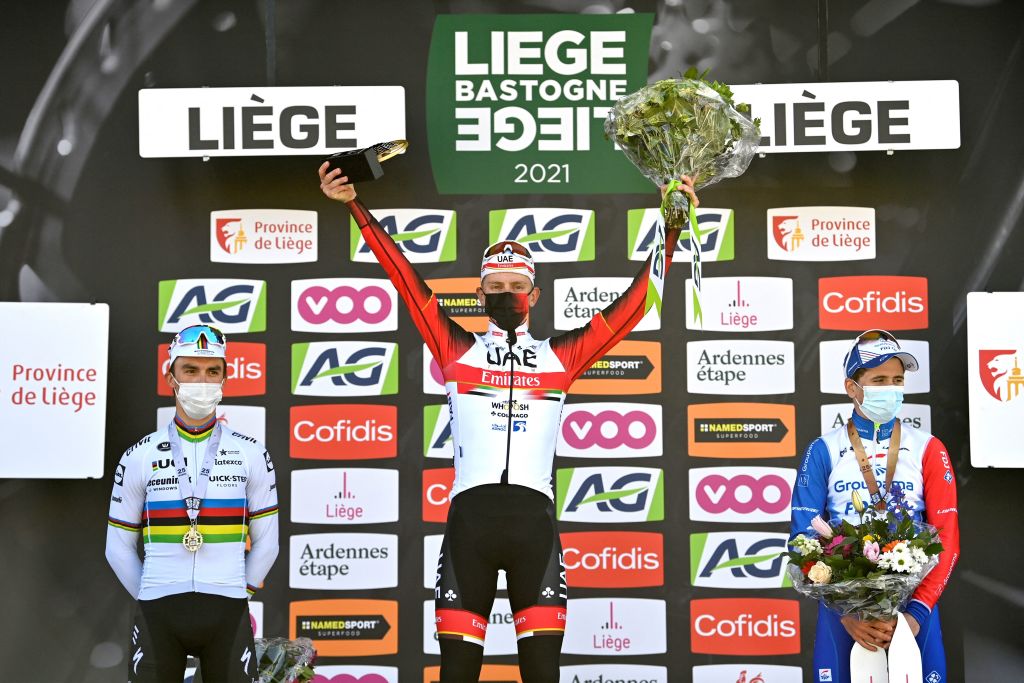
'From now on, everything is a bonus'
“Everything from here on is a bonus” was what Van der Poel said after winning the Tour of Flanders. Taking Paris-Roubaix seven days later only lends his phrase greater resonance.
But it’s notable too, if logical, that the Dutchman will be sticking to his script of avoiding any lesser challenges en route to a possible third Monument victory, and rather than take the 2023 Pogačar route of riding in all three Ardennes Classics, he’ll be skipping La Flèche Wallonne (in theory at least) to focus all his efforts and presumably ebbing energy on Liège.
As for Flèche, a much tougher finishing circuit for Europe’s only WorldTour Classic to finish on an uphill, featuring four ascents of the Mur de Hûy rather than the three of previous years, it was planned that Primož Roglič (Bora-Hansgrohe would be making his 2024 Ardennes debut at the race.
A former winner of Liège-Bastogne-Liège, Roglič’s status as a lead outsider would arguably be even higher if the Slovenian had not been caught in the terrible mass crash in Itzulia Basque Country.
However, he'll now miss Ardennes week, despite coming out of the crash fortunate to be one of the more lightly injured riders who went down. With both Flèche and Liège taken off his racing programme, Van der Poel's task at the latter has been made a little 'easier', if one can employ that word in the context of the 255km Monument.
Still, seeing how riders who are in principle more suited to the longer, sharper climbs of Liège-Bastogne-Liège than Van der Poel is just one of the many storylines in this year's Ardennes.
But for all Van der Poel could be more vulnerable than in the cobbled Classics, one place where he can yet outflank all his rivals next week, except perhaps Pogačar, is in terms of pressure.
Win or lose, Van der Poel's and Pogačar's spring campaigns have already been a triumph. Van der Poel’s two Monuments to date make for an even more notable spring than that enjoyed by the rider currently ranked number one in the world.
What's striking in any case, is what is at stake for both riders and how different it is: Pogačar will surely want to make a point of using the race which marked a turning point in his previous indomitable 2023 campaign as the springboard for the Giro d’Italia.
But for Van der Poel, Liège (and Amstel before that) feel simply like a potential scenario for a glorious encore, races where he has nothing to lose by kicking back a little, thinking less and following his instincts - as well as being a hugely prestigious opportunity to extend his reign as Classics King of the 2024 season.
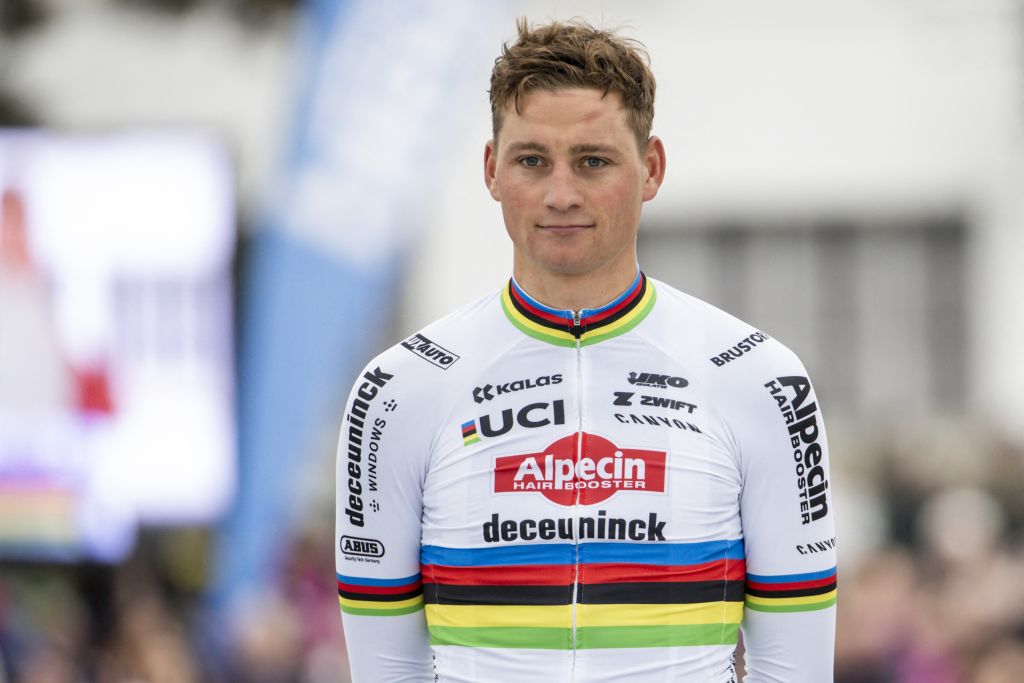
Get unlimited access to all of our coverage of the Spring Classics- including reporting, breaking news and analysis from Paris-Roubaix, Amstel Gold, Liège-Bastogne-Liège and more. Find out more.




